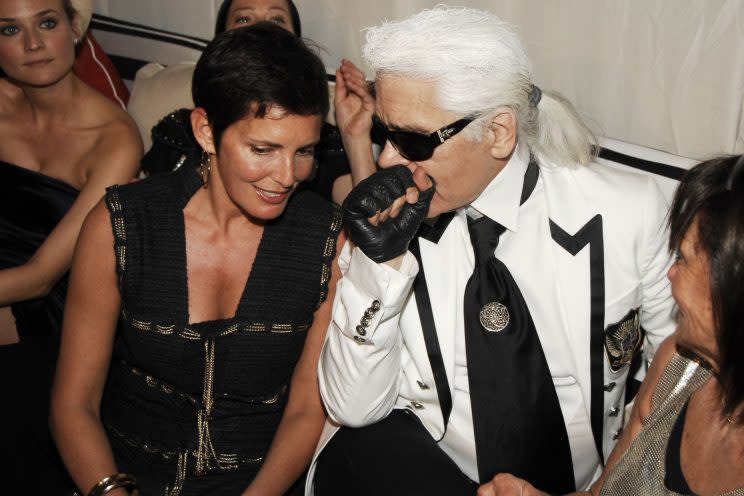Former Chanel CEO: The Luxury Market ‘Bubble’ Hasn't Popped, but Air Is Leaking

A lot has changed since Maureen Chiquet became global CEO of Chanel in 2007.
Her mentor, Mickey Drexler, was midway through a journey that would transform J.Crew into an ultra-successful mass market fashion brand. E-commerce was hardly the force it is today, with sales estimated at only $136.4 billion. And the worldwide economy teetered on the edge of what would be a devastating recession.
By the time she’d been fired from Chanel nine years later, Drexler still sat at the top of J.Crew, but the brand suffered from a lack of vision as well as a sales slump; e-commerce sales had soared to $394.86 billion. And shoppers seemed to have long forgotten the devastation the worldwide recession brought; in 2016 the luxury goods market maintained sales that surpassed $270 billion, capping years of increased consumption.
“Let’s not forget that 2007 was a year after Time magazine called Person of the Year ‘user generated content,'” Chiquet told Yahoo Style. “So, you’re sitting at the helm of a luxury brand that depends on having an authoritative voice, and now you know that anybody can publish anything on the Internet. It was completely a confusing era.”
“We were all asking ourselves questions like, ‘Do we go on Facebook?’ ‘Should we sell online?’ ‘Does that make our brand cheaper?’ ‘What do we do with the beautiful boutiques we’ve invested in?’’
For each of those questions, answers are obvious or elusive. Facebook and e-commerce? Duh. Costly flagship locations that don’t make much money? A little trickier to answer. Chiquet, a St. Louis-bred American, attempted to navigate all of that in the top position at what is arguably the most valuable and prestigious global fashion brand.

Luckily for Chiquet, she is now relieved of the duty of finding answers to the most difficult of those questions. Instead, the former CEO is on a book tour, promoting Beyond the Label — a lightning-quick read that chronicles her time at L’Oreal, The Gap — and ultimately, Chanel.
The retrospective comes at an pivotal time for Chiquet and for the larger retail market. Chiquet says the market has a “bubble that maybe hasn’t popped, but a small pin has been put in it and air is leaking.” She thinks a correction might be due.
As pressure mounts in the face of “the most challenging environment in two decades,” retailers — especially publicly owned companies — are attempting to cut costs where they can, primarily through store closings and mass layoffs, and for her mentor Drexler, reorganizations. But as a private company, Chanel was insulated from headwinds a bit more than the rest of the market, Chiquet says.
“The benefit for me being in a privately held company was that we could take our time; we could do things in a measured way,” Chiquet said of her time at Chanel. “People are taking sales associates off the floor — it’s crazy. In that case, being with private equity, it was beautiful to be able to say we preserve our customers, our relationship with our customers, and that we preserve our brand.”
As a private company, the details of Chanel’s business are as closely protected as its image. But that doesn’t mean it’s totally shielded from shifts in the luxury market.
Chanel International B.V.’s 2015 revenue, the most recent figures available, fell 17 percent — to $6.24 billion — according to its filing with a Dutch exchange. Comparatively, Prada revenue fell 10 percent in 2016, to nearly $3.5 billion. Most brands, including Chanel, have been squeezed by depressed sales in China, which represents half the global luxury market. Chiquet admits that the Chinese market represented a challenge (she calls it an opportunity) for the brand, both in connecting with unfamiliar consumers as well as staving off counterfeits from that market.
To be sure, China isn’t the only problem both luxury and mass market retailers have to address today. There are millennials who are spendthrifts on experiences, not clothes (“They’re in their $2,000 Yves Saint Laurent pants at Coachella, but they’re secondhand Yves Saint Laurent pants”); there’s also the problem of maintaining a meaningful brand identity in an age of overconsumption, and in a time when the secondhand market cannibalizes sales of luxury goods.
As for Chiquet, she’s no longer bothered by any of those problems — at least not right now. Instead, she’s just trying to navigate the fashion world as a shopper.
“I do feel like it’s massively confusing now to shop,” she said. “Personally, I go out and I look for clothes for myself, and I am overwhelmed by the sameness and amount of choices.”
A problem for another CEO.
Read more from Yahoo Style + Beauty:
Spanx Founder Sara Blakely Shares Empowering Message About Following Your Dreams
Every College Accepted Her: ‘Black-ish’ Star Yara Shahidi Is Hollywood‘s Most Stylish History Nerd
Woman Shares Mastectomy Scar and Powerful Message: ‘Representation Matters’
Follow us on Instagram, Facebook, and Pinterest for nonstop inspiration delivered fresh to your feed, every day. For Twitter updates, follow @YahooStyle and @YahooBeauty.
Alexandra Mondalek is a writer for Yahoo Style + Beauty. Follow her on Twitter @amondalek.
